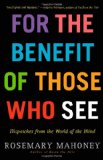Summary | Excerpt | Reviews | Beyond the Book | Readalikes | Genres & Themes | Author Bio

Dispatches from the World of the Blind
by Rosemary MahoneyVision
Not long ago I accompanied my boyfriend to Jerusalem for his laser eye surgery appointment. From Cyprus, where Aias lives, Israel is a forty-minute flight; you've hardly taken off from Larnaca's tiny airport before you're skidding to a landing again at Ben Gurion Airport in Tel Aviv. The surgery took place in the private clinic of an Israeli ophthalmologist of considerable reputation. This ophthalmologist doesn't smile much, but his mouth is slightly lopsided in a way that makes him look perpetually on the verge of a smile. He looks as though he is privately enjoying a mildly amusing joke, although after spending twenty minutes in his company one suspects there really is no joke, it's just the way his mouth is. He is short and stocky and neckless, and though his eyes are small and set close together, and though he doesn't truly smile, there is warmth in his face. He walks slumped a bit to the right, as if he has too much ballast in his starboard pocket, and moves through his clinic in a dogged way, like a weary commuter trudging through Grand Central Station at rush hour. His pending smile notwithstanding, I got the distinct sense that the surgeon was thoroughly bored with his job. At any one time there were approximately fifteen patients sitting in his waiting room, waiting for a first consultation or waiting for their surgeries or waiting, eyes bandaged, for their follow-up appointments. Each time I found myself in this room (I found myself there on three separate occasions), I could not refrain from counting the number of patients and doing a little mathematical calculation. If Aias was paying four thousand euros for his surgery, then the others probably were too. 15 x €4,000 = quite a lot. The ophthalmologist was possibly bored but certainly rich.
In first consultation, the surgeon explains the process with sentences he has used hundreds—perhaps thousands—of times before. His style is sleepily deadpan, which somehow lends him an air of incontrovertible authority. Probably because he is required to, he offers a brief overview of the possible negative outcomes of the procedure, that one-in-a-million chance that you will emerge from his surgery worse off than when you went in, that wholly far-fetched possibility that you might come out of his surgery not just your same old presbyopic self but plumb blind—or, if not blind, then at least optically diminished in one way or another.
After detailing these disturbing possibilities, the surgeon looks at you and blinks dryly, waiting for your horrified reaction. The dry blinking is a prompting of sorts, a cue, a wry indication that you have nothing to worry about, that it is extremely unlikely that you will go blind under his expert care. And so, somewhat intimidated by the entire enterprise, swept along by the rush of medical language and quite in the dark as to what it all means, a bit too polite to turn back now, the patient does not react in horror but simply nods and smiles with false detachment to show that, yes, of course, it would be ridiculous and perhaps a bit hysterical of him to think that he might come out of this costly surgery worse off than when he went in.
Before beginning his work on Aias that day, the surgeon asked me if I would like to observe the procedure from a small room adjoining the operating theater. From there, I would be able to see the surgery not only through a plate-glass window but also, highly magnified, on a television screen above the window—an exact broadcast of what the surgeon himself saw through his double-barreled microscope. Generally eager to observe just about anything new, greedy for any unusual experience, easily seduced by the wonders of modern technology, and lulled by the surgeon's dispassionate manner, I said without thinking, "Yes."
Of course, the moment I saw Aias's eye—that most vulnerable of organs—tremblingly huge on the screen, I felt that perhaps I had made a mistake in choosing to observe. Magnified a thousand times, the eyelids looked like desert dunes, the lashes like wind-tossed palms, the creases in the skin like a hundred parched arroyos. The rims of the enormous lids were raw and pink, damp and very tender-looking, the blue iris so immense it looked astral, like an exploding star, and the crimson blood vessels were dense and tangled as tree roots. How horribly exposed that eye appeared, how creepily suprahuman. In a sympathetic reaction of discomfort, my own eyes began to blink and water.
Excerpted from For the Benefit of Those Who See by Rosemary Mahoney. Copyright © 2014 by Rosemary Mahoney. Excerpted by permission of Little Brown & Company. All rights reserved. No part of this excerpt may be reproduced or reprinted without permission in writing from the publisher.
Nearly all men can stand adversity, but if you want to test a man's character, give him power.
Click Here to find out who said this, as well as discovering other famous literary quotes!
Your guide toexceptional books
BookBrowse seeks out and recommends the best in contemporary fiction and nonfiction—books that not only engage and entertain but also deepen our understanding of ourselves and the world around us.